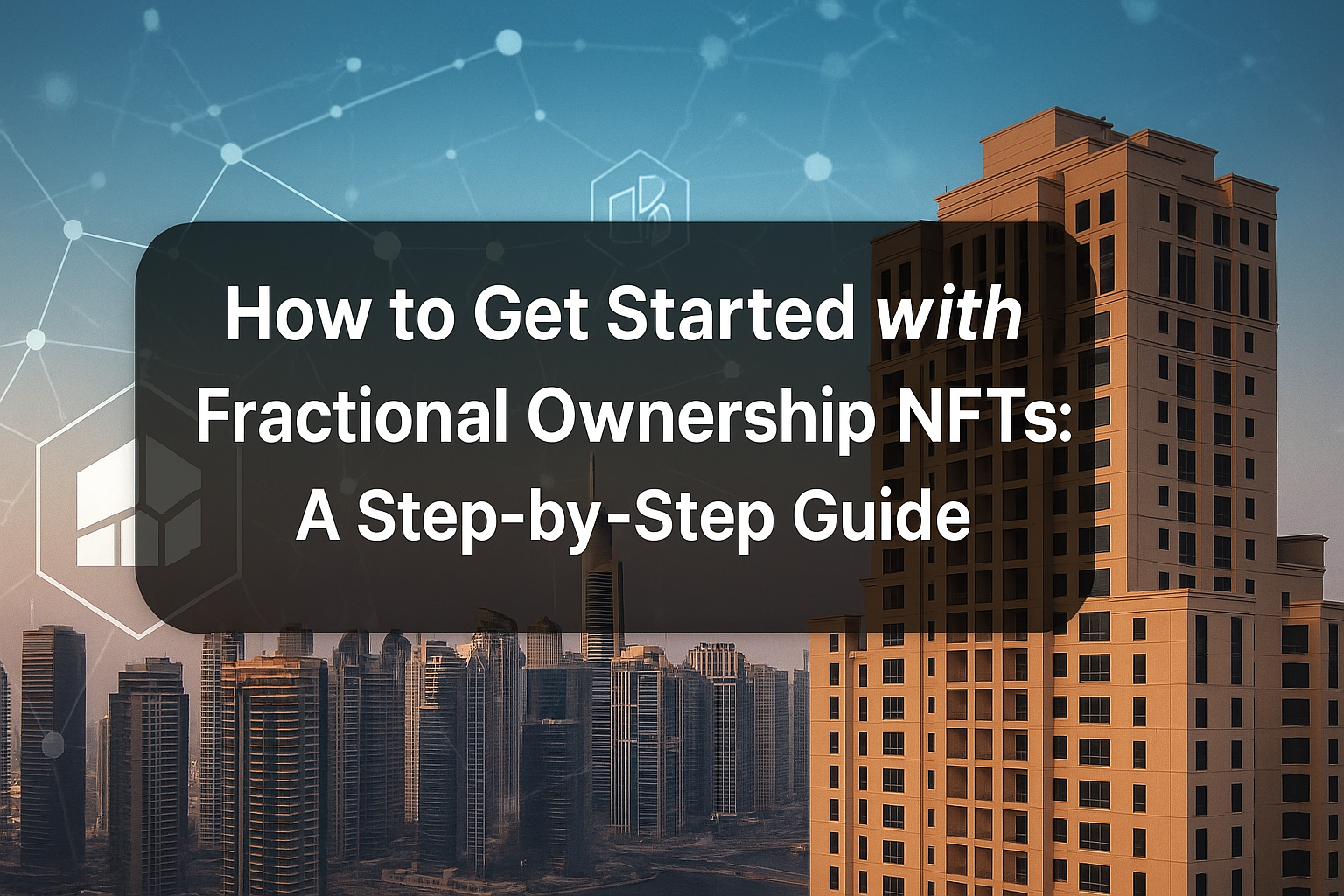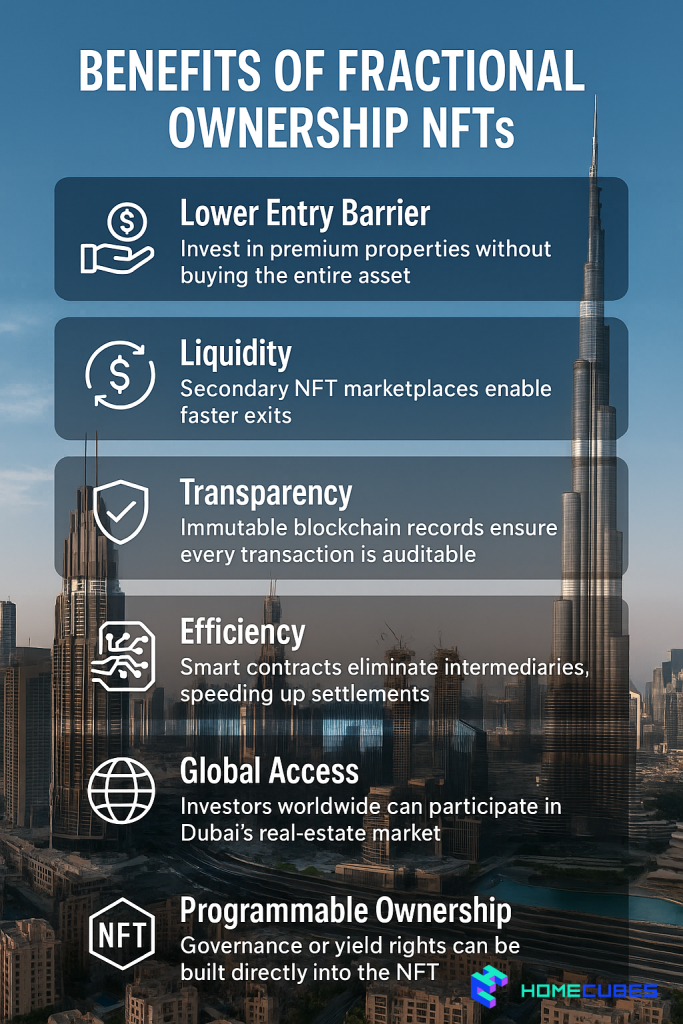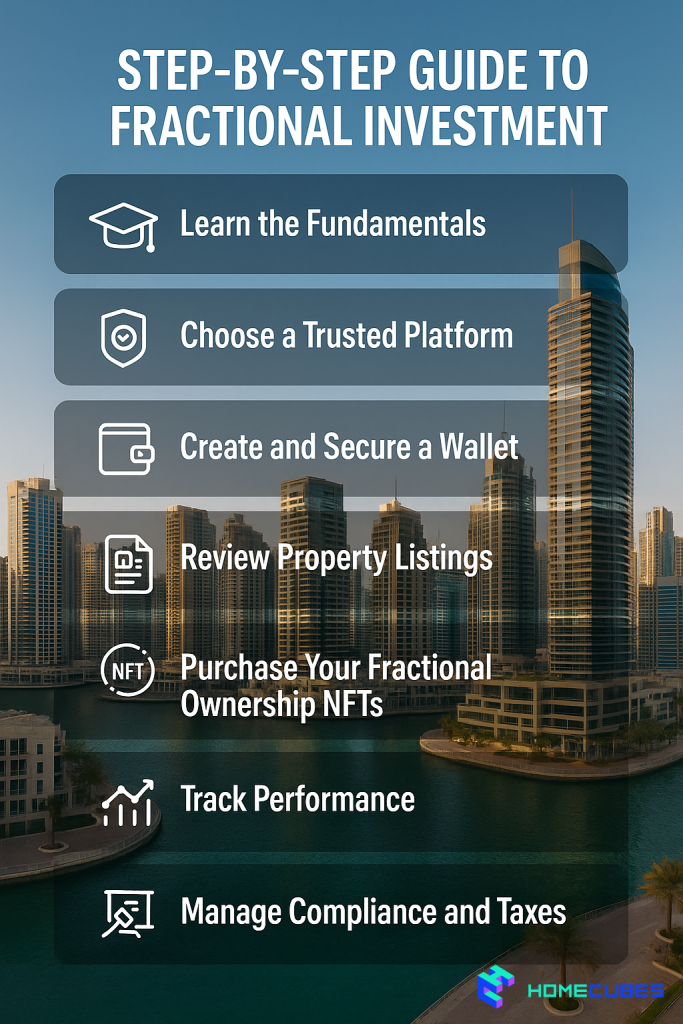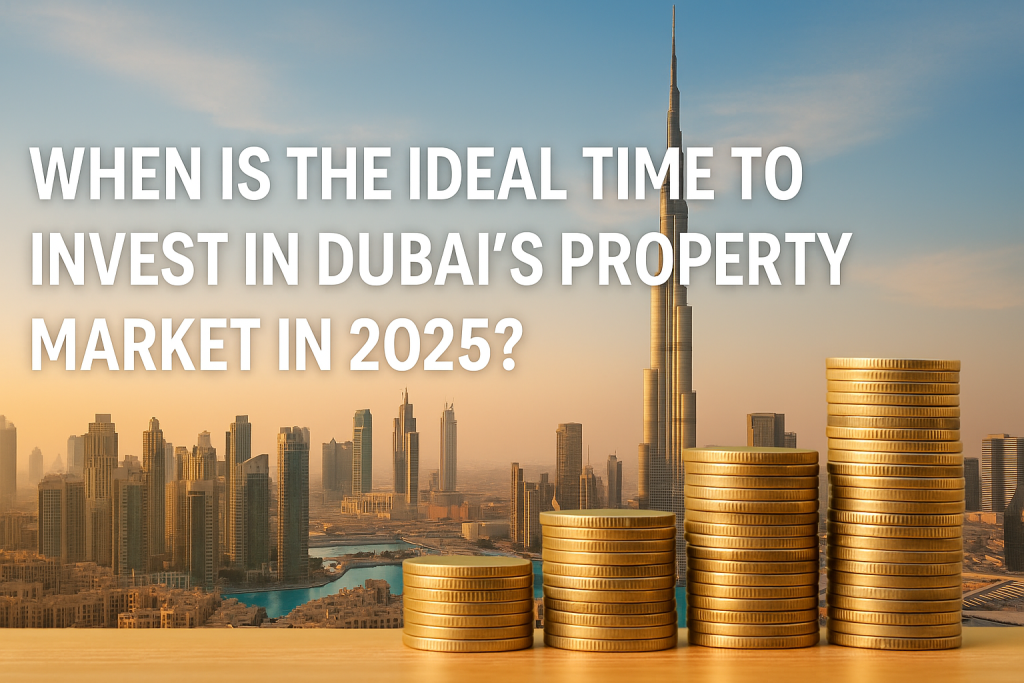

Table of Contents
- Introduction: Why Fractional Ownership NFTs Matter
- Understanding Fractional Ownership NFTs
- Benefits of Fractional Ownership NFTs
- How Fractionalization Works in Real Estate
- Step-by-Step Guide to Get Started
- Legal and Regulatory Context in Dubai
- Case Study: Fractionalizing Dubai Marina Apartments
- Fees and Charges Involved
- Risks and Challenges
- Common Mistakes to Avoid
- Market Outlook 2025–2030
- Frequently Asked Questions (FAQs)
- Final Thoughts
- Work with Homecubes
Introduction: Why Fractional Ownership NFTs Matter
Real estate has long been the world’s most reliable wealth-building asset — but it’s traditionally out of reach for many investors. Large down payments, maintenance responsibilities, and complex legal processes create high barriers to entry.
Blockchain technology in real estate is transforming this dynamic. Through fractional ownership NFTs, property can now be divided into digital shares that anyone can buy, sell, or trade with minimal friction.
This fractional ownership NFTs guidance explains exactly how to start — from legal structure and platform selection to fees, risks, and Dubai’s emerging regulatory frameworks — helping you enter this new era of tokenized real estate confidently.
Understanding Fractional Ownership NFTs
We’re on a mission to democratize the $1.7 trillion fine $art market for you. By fractionalized ownership, multiple people are able to own a fraction of the high-end artworks. This allows you to not only begin your foray in the art world but also diversify your portfolio. #artfi pic.twitter.com/qY9GtUteFS
— Artfi (@artfiglobal) May 8, 2024
Unlike traditional real estate investment, fractional ownership allows multiple investors to co-own a single high-value asset. Each investor’s portion is represented by a token or NFT that proves their share on a blockchain.
An NFT (non-fungible token) is unique by design. Unlike fungible cryptocurrencies (like Bitcoin), each NFT contains specific metadata — ownership details, property ID, rights, and transaction history.
When applied to real estate:
- NFTs act as tamper-proof certificates of fractional ownership.
- Smart contracts handle rent distribution, resale rights, and governance.
- Transactions are recorded transparently on a decentralized ledger.
Tokenization brings security and automation to property ownership. As financial institutions recognize its potential, it is reshaping how assets are held and traded globally.
Benefits of Fractional Ownership NFTs

- Lower Entry Barrier – Invest in premium properties without buying the entire asset.
- Liquidity – Secondary NFT marketplaces enable faster exits.
- Transparency – Immutable blockchain records ensure every transaction is auditable.
- Efficiency – Smart contracts eliminate intermediaries, speeding up settlements.
- Global Access – Investors worldwide can participate in Dubai’s real-estate market.
- Programmable Ownership – Governance or yield rights can be built directly into the NFT.
According to the World Economic Forum: How will asset tokenization transform finance, tokenized assets could represent over $16 trillion globally by 2030, making fractionalized real estate a leading use case for democratized investment.
How Fractionalization Works in Real Estate
The process combines off-chain legal setup and on-chain token issuance:
- SPV Formation: The property owner transfers legal title to a Special Purpose Vehicle (SPV).
- Tokenization: The SPV issues NFTs representing ownership shares.
- Smart Contract Deployment: Governs profit distribution, transfer conditions, and voting.
- Investor Onboarding: Investors complete KYC and purchase NFTs.
- Revenue Distribution: Rents or dividends are automatically distributed via blockchain.
Dubai is at the forefront of exploring these models through its Dubai Land Department Real-Estate Tokenization (REES) pilot, which aims to merge blockchain efficiency with formal land-registry oversight.
Step-by-Step Guide to Get Started

1. Learn the Fundamentals
Study blockchain basics — wallets, smart contracts, and gas fees — and combine them with property-investment fundamentals such as valuation and yield.
2. Choose a Trusted Platform
Select a platform with transparent governance, audited contracts, and local compliance. In Dubai, platforms must eventually align with VARA Rulebooks governing issuance, custody, and broker-dealer activities.
3. Create and Secure a Wallet
Use reputable wallets (e.g., MetaMask, Trust Wallet). Back up private keys safely — losing them could mean losing ownership.
4. Complete KYC and Deposit Funds
Licensed platforms will require Know-Your-Customer verification. You can fund your account in AED or in stablecoins like USDT or USDC.
5. Review Property Listings
Evaluate properties for:
- Location and market demand
- Yield expectations
- Number of NFTs issued
- Governance and resale rights
6. Purchase Your Fractional Ownership NFTs
Once due diligence is complete, execute the purchase. The NFTs will appear in your wallet as proof of fractional ownership.
7. Track Performance
Monitor rent payments, maintenance updates, and price appreciation through the platform dashboard or blockchain explorer.
8. Manage Compliance and Taxes
Dubai currently has no property tax, but overseas investors should check home-country reporting requirements.
Legal and Regulatory Context in Dubai
Dubai’s Virtual Assets Regulatory Authority (VARA) is the first dedicated regulator for digital assets in the Middle East.
The VARA Rulebooks provide frameworks for token issuance, custody, and secondary trading.
Key highlights:
- Platforms offering fractionalized real estate tokens must register as Virtual Asset Service Providers (VASPs).
- Custody rules mandate segregation of client assets and continuous audits.
- Marketing and risk-disclosure obligations protect investors.
Additionally, FSRA Guidance on Virtual Asset Activities (ADGM) provides UAE-wide clarity outside of VARA’s jurisdiction, classifying certain tokenized properties as regulated securities.
Dubai’s own Real-Estate Tokenization eService integrates land-registry verification with blockchain issuance, paving the way for licensed fractional-ownership models.
Case Study: Fractionalizing Dubai Marina Apartments
Imagine a luxury apartment in Dubai Marina valued at AED 10 million. Instead of selling it to one buyer, an SPV tokenizes the property into 1,000 NFTs, each priced at AED 10,000.
- Each NFT represents 0.1 % ownership.
- Rental yield is projected at 7 %, distributed quarterly in stablecoins.
- Smart contracts automate rent payments and enable secondary-market sales.
- NFT holders can collectively vote on major property decisions.
This model offers retail investors exposure to Dubai’s thriving waterfront property market while maintaining blockchain-level transparency and liquidity.
Fees and Charges Involved
Tokenized property ownership involves several cost components:
- Minting and Gas Fees: Blockchain transaction fees for issuing NFTs.
- Platform Fees: Around 1–3 % of transaction value.
- SPV Administration: Annual legal and auditing costs.
- Maintenance and Property Management: Deducted from rental income.
- Exit Fees: Secondary-market trading commissions.
Understanding these ensures realistic yield projections. For instance, a gross 7 % rental yield could translate to roughly 5.5 % net after expenses.
Risks and Challenges
Every new asset class comes with risk:
- Regulatory Shifts: Rules may evolve as VARA finalizes token-classification standards.
- Liquidity Risk: Secondary-market depth may remain limited in early stages.
- Smart-Contract Bugs: Poorly audited contracts can freeze or misroute funds.
- Title Enforcement: Misalignment between digital tokens and off-chain deeds.
- Valuation Fluctuations: Real-estate cycles still apply.
- Custodial Solvency: Platform failures could jeopardize investor access.
These challenges underline the importance of regulated environments and professional oversight.
Common Mistakes to Avoid
- Investing in unlicensed offshore platforms.
- Ignoring due diligence on property and management company.
- Misunderstanding NFT rights — ownership vs. income entitlement.
- Losing private keys without recovery options.
- Failing to review platform fee disclosures.
- Relying on speculative resale prices instead of rental yields.
Proper risk assessment and compliance checks can prevent costly errors.
Market Outlook 2025–2030
Dubai’s leadership in virtual-asset regulation positions it for exponential growth in property tokenization. The city is aligning land-registry infrastructure with blockchain to attract institutional capital.
According to Deloitte: Tokenized real estate (2025), tokenized property could account for 8–12 % of global real-estate transactions by 2030.
Expect major trends such as:
- Integration with CBDC-settlement systems to reduce FX risk.
- Expansion of regulated secondary markets.
- Institutional adoption through custodial banks and REIT conversions.
- Enhanced investor protection through standardized disclosures.
Dubai’s DLD–VARA collaboration ensures that fractional-ownership NFTs evolve under a compliant and transparent regime, positioning the city as a global model for tokenized property frameworks.
Frequently Asked Questions (FAQs)
Q: Are fractional ownership NFTs legal in Dubai?
A: Yes, provided they comply with VARA and DLD frameworks using SPVs or regulated custodians.
Q: Can I sell my NFT fraction anytime?
A: Secondary trading is allowed once lock-up periods end, depending on platform rules.
Q: Do NFT holders earn rental income automatically?
A: Smart contracts distribute rent in stablecoins or AED equivalents to wallet addresses.
Q: Is KYC mandatory?
A: Yes. VARA and ADGM require full KYC/AML compliance for investors.
Q: Do NFTs grant UAE residency?
A: Only if the underlying property value meets DLD thresholds for investor visas.
Final Thoughts
Fractional ownership NFTs combine blockchain transparency with real-world assets, creating an inclusive investment path for both retail and institutional investors.
Yet, success depends on legal structure, platform integrity, and compliance. Dubai’s proactive approach through VARA and DLD ensures that this innovation matures under clear, enforceable standards.
If you follow the fractional ownership NFTs guidance provided here — understanding risks, verifying licensing, and diversifying smartly — you’ll be well positioned to benefit from this transformative trend.
Work with Homecubes
Homecubes is building a compliant real-estate tokenization platform in Dubai. Our mission is to democratize property ownership while maintaining legal and regulatory transparency.
We have applied for our VARA license, which is currently under review. Once granted, Homecubes will launch a secure platform allowing global investors to buy fractional property NFTs backed by Dubai real estate.
If you’d like personalized consultation, early access, or expert fractional ownership NFTs guidance, contact us here.
Homecubes — bridging real estate and blockchain, responsibly and transparently.










